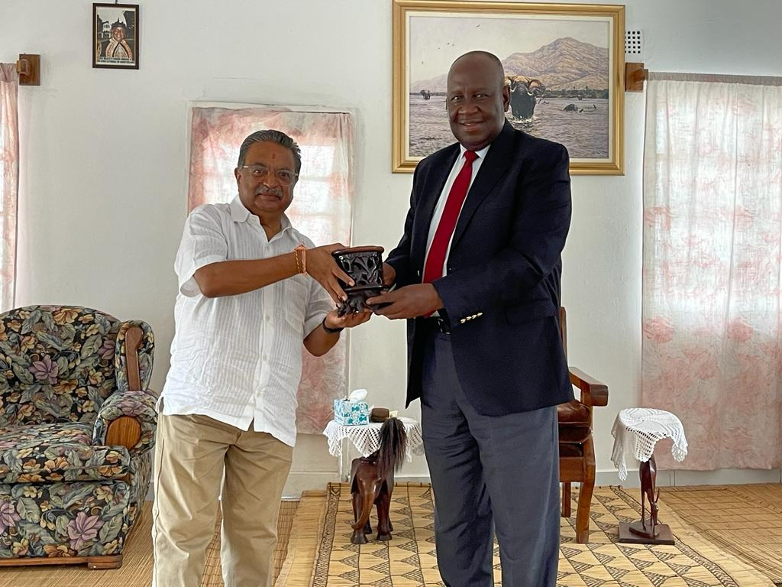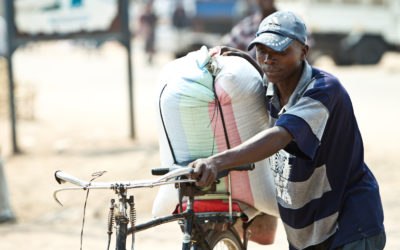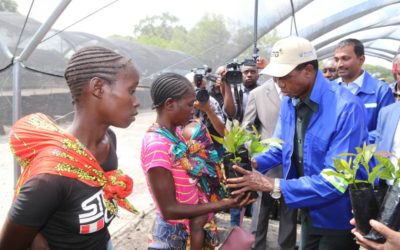Cashew in Zambia: Synergistic Interventions Paving the Path to Success

“You can’t go back and change the beginning, but you can start where you are and change the ending.” – C.S. Lewis
After a long time, I was recently able to travel to Zambia, a country I am particularly attached to. Flying low over the flood plains in the Western Province, I was struck as always by its striking and unique landscape, and the vast potential it holds for agricultural growth.
In Zambia, EFF, along with ETG, has put tremendous efforts into rejuvenating the cashew value chain in both the Eastern and the Western Provinces. Over the two crop cycles since the first project was awarded to us, we have been able to facilitate the planting of more than six million cashew seedlings amongst 60,000 smallholder farmer partners across Zambia. In the Western Province, we facilitated the replanting of 7,000 hectares of bare areas within the existing cashew plantations and 43,000 hectares of new cashew farms. Moreover, by adopting good agricultural practices, we have rehabilitated 8,000 hectares of current plantations.
The primary reason for my trip, besides meeting the team and visiting the project sites to experience first-hand the extensive work we are doing there in the cashew value chain, was to witness a small miracle: the high-yield variety cashew seedlings that ETG & EFF had planted in the Western Province of Zambia during the 2019-20 season, as part of the AfDB-funded Cashew Infrastructure Development Project, were already producing nuts. And the nuts were far better in quality than those of the existing trees.
The difference that EFF is making in Zambia has not gone unnoticed. The Barotse King of Western Province, HE King Litunga, granted us the honour of paying him a personal visit in the Kashandi of his palace, a place reserved for meeting his most special guests. I was delighted to receive from him an ornate bowl with animal engravings on it, again something which is an extremely rare gesture. We expressed to His Majesty our concerns about the project ending and discussed a strategy to ensure its sustainability until at least all the seedlings planted achieve full maturity and productivity in the next five years.
Additionally, it is our intention to plant about three million cashew trees per year over the next five years in the Western Province of Zambia. I believe that it is possible for communities in these regions to prosper from cashew cultivation. To make this a reality, we need to continue to work together, as this is just the beginning. Synergistic partnerships and an aligned vision between all stakeholders are extremely vital, for which we must continue our efforts over at least the next five years.
During this time, we also intend to partner with the Zambia Agricultural Research Institute (ZARI) to facilitate research and development on various aspects of cashew cultivation, especially the characterization of cashew germplasm and cashew conservation. We will continue to rehabilitate the existing plantations that have gone dormant as a result of improper maintenance. This rehabilitation exercise will require adequate approvals from the local governance council, which was also one of the aims of my trip there.
To this end, we held meetings with the provincial administration, including the Provincial Minister, Permanent Secretary and Provincial Agriculture Coordinator, to impress upon them the need to solve farmers’ problems and support other value chains such as rice that can help enhance farmer incomes.
I also visited our smallholder farmer partners’ fields and enquired about the challenges that they are facing and how these can be remedied, while impressing upon them the need to be more self-dependent and not wait for aid for activities that they can perform themselves.
The story of our involvement in cashew in Zambia goes as far back as March 2016, when I commissioned a feasibility study. It is only now starting to bear some fruit. I am grateful for the work done by the entire Zambia team to bring the project to this stage. At the same time, I would like to reinforce to them and to our partners that sustainable agricultural projects take between 7-10 years to solidify. We are well on the path of achieving our shared vision of moving smallholder farmers away from subsistence farming to semi-commercial operations, but we still have a long way to achieve it. Godspeed and full steam ahead!
Continue Reading
Turning air into potable water
As we approach World Water Day on 22nd March and stop to consider the ongoing global water crisis, I would like to share a story about a start-up that is tackling the issue of access to safe drinking water through ingenious and rather magical machines: atmospheric water generators.
Ghana’s Planting for Food & Jobs strengthened by input supply
Six months ago, I was in Accra for the African Green Revolution Forum (AGRF), a fitting location considering that Ghana’s admirable record of poverty reduction over the last two decades has largely stemmed from strong agricultural performance.
Reviving the cashew industry in Zambia
Over the last few months, ETG and the ETG Farmers Foundation have been involved in an unprecedented cashew rehabilitation and rejuvenation project in Zambia. The AfDB funded Cashew Infrastructure Development Project (CIDP) is one of the Government of Zambia’s priority programmes.




0 Comments